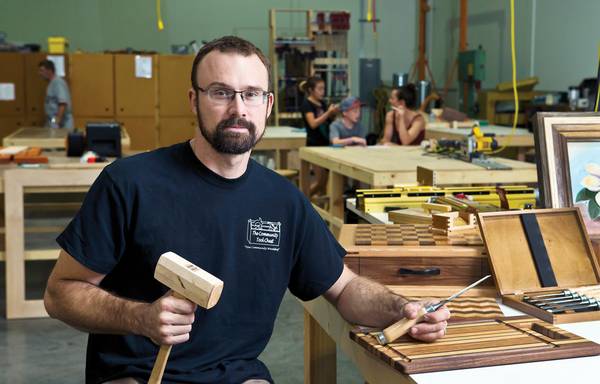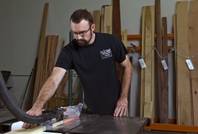Describe your business.
The Community Tool Chest is a community woodshop. We have 6,500 square feet of warehouse and classroom space filled with professional woodworking tools and equipment, available for use by the general public. We function similar to a gym, except we provide access to woodworking equipment instead of weightlifting equipment. We have a similar membership model, with different options including day, week, month and five-or 10-punch passes.
Also like a gym, we offer classes to teach and motivate our members, from cutting boards to elegant end tables.
Most of all, we offer a place for our community to meet and mingle with other like-minded people. We even have a member lounge with couches and woodworking books and magazines, so people can relax, learn and be inspired.
Who are your customers?
Our members are male and female, young and old, rich and poor, retired and working, locals and implants. We welcome all, encourage diversity and love sharing woodworking with everybody. It’s human nature to want to make, build, explore, grow, learn and be productive. In a world where most productivity, communication and expression is online, our customers enjoy creating items that are hands-on and tangible.
What are some of the most popular projects people come in for?
The most common has been the cutting board because it is simple, rewarding and a traditional new woodworker’s first project. The most unusual project probably was an iguana cage, complete with plexiglass and removable droppings tray. Other projects have included chessboards, repurposing an antique bed frame into candleholders and bookends, giant Jenga, ladder golf, business card boxes, end tables, vertical gardens, butcher-block counter treatments, picture frames, phone cradles, joiner mallets, magazine racks, doorstops and “rebuilding” a 1920s-era chest of drawers that a member’s grandfather pulled out of a burning building. Wood is a very versatile medium. The possibilities are limitless.
What was your inspiration for opening the Community Tool Chest?
I was introduced to woodworking as a freshman in high school and instantly fell in love with it. I took as many shop classes as possible and considered becoming a shop teacher. But I read the writing on the wall and could tell that high school shops were, unfortunately, being phased out. Instead I got a history degree but wound up working traveling construction gigs.
After graduating from college, I discovered a community woodshop in Pittsburgh, joined and eventually worked there for a while. It was while working in the shop that I thought maybe one day I could set something up similarly. Over the years, I’ve enjoyed woodworking every chance I could but was always limited by not having an entire shop full of tools. The community access model solves that problem for an entire city.
What’s the most important part of your job?
We take great pride in the safety of our members, which is a product of purchasing the safest tools available, with the safest accessories, and then teaching safe practice.
Almost as important is the part of the job we love most: empowering others to be successful through instruction and guidance. Staff members will always be on hand to help members through projects, whether in a class or building something on their own.
And finally, marketing. While we wish we could just play in the shop all day long, this is still a business, and it’s up to us to get the word out. We try to spend several hours every day trying to get the word out that we’re here. We have a long way to go.
What is the hardest part about doing business in Las Vegas?
Las Vegas is the Entertainment Capital of the World, so there are many entertainment options. From movies and hiking to strip clubs and the Smith Center for the Performing Arts, nobody is sitting around all day wondering what to do. From a marketing perspective, there is so much noise, it is hard to be heard.
Also, Las Vegas is a tourist destination, with bargains on every corner. Locals and visitors have grown accustomed to getting a great deal, so finding the right price that draws people in but manages to make the business profitable has been a challenge.
What is the best part about doing business in Las Vegas?
Like a lot of locals, we think of Las Vegas as a big “small town.” It’s great getting to meet so many of the locals, finding out the people we know in common, the things we all like to do.
What obstacles has your business overcome?
Getting the Community Tool Chest open has been a long and involved process. We originally applied with the Downtown Project, but it didn’t work out with them. Next we tried applying for bank loans but discovered it is still hard for new businesses to get startup capital. So, we buckled down and did it the old-fashioned way: worked hard and saved up. It took quite a while, but we eventually built up enough cash and purchased enough tools that we felt ready to pull the trigger.
We thought finding a building would be easy but discovered that was not so. Commercial real estate wasn’t hit as hard in the valley as residential, and it bounced back sooner. Occupancy rates are up all across the valley, and rent is increasing. Landlords can afford to be choosy, and startup businesses are considered a risk. Plus, we needed a building with enough power, parking, and square footage, with a good location and price. It turned into quite the process.
Finally we found a place we liked, pulled the trigger, and the Community Tool Chest was born. Hopefully we’ll be around for years to come, and all sorts of projects, big and small, will keep pouring out of the shop.
How can Nevada improve its business climate?
We think it would be great to see more startups get their chance. Nevada seems to be bouncing back from the recession fairly well, but startup businesses are still having trouble. Rising rent, onerous lease agreements, lack of lending for startups; things like that hurt the most for new businesses, and there’s not much potential entrepreneurs can do about it. As such, many potential new and possibly great businesses get nipped in the bud before anyone even gets them off the ground.
In particular, we would love to see a program similar to the Small Business Administration jump in and start helping with leases. The SBA guarantees banks 50 percent of their money back if a new business defaults on its loan, making it more likely for banks to take the risk. Landlords have no such insurance, so instead they resort to onerous, inescapable leases, which terrify new businesses. A program making it less of a risk for landlords to rent to a startup, and making it less terrifying for new business owners to literally sign their life away to landlords, could do wonders to stimulate entrepreneurs into taking the plunge.


